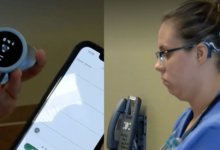The role of apprenticeships in growing the nursing workforce

With interest in traditional degree nursing appearing to wilt, some people believe that apprenticeships are the key to growth in the profession by offering a pathway for those who could never become nurses otherwise.
In 2017, nursing apprenticeships were created in England. For some, the prospect of earning while learning was more realistic than studying at university for three years, with the degree bursary having been removed the same year.
“I would not be sitting where I am now if it wasn’t for this opportunity”
Tom Wintrip
Tom Wintrip is currently on Northumbria University’s 18-month top-up nursing degree apprenticeship, at the end of which he will be a registered nurse.
He joined the NHS eight years ago as a healthcare assistant (HCA) in the emergency department, before completing a nursing associate apprenticeship. Last year, he began on the top-up course.
Becoming a nurse would have been completely off the table had it not been for the apprenticeship route, in large part due to the absence of the nurse degree bursary, he said.
“I would not have been able to afford to go to university and train traditionally… I would not be sitting where I am now if it wasn’t for this opportunity,” said Mr Wintrip.
“You can learn and still earn at the same time; the bills are still getting paid, you’re not getting into debt and yet you’re still getting where you need to be in your career.”
Mr Wintrip recently began his latest placement in ambulatory care at Northumbria Healthcare NHS Foundation Trust.
He explained that a typical week was weighted towards learning on the job, with 22 hours on placement, and then two days of learning – one of taught education and another of independent study.
He said that he and several other apprentices on his course began the training after working for years as an HCA, and felt that this route into becoming a registered nurse had huge benefits in terms of working with others.

From left, Tom Wintrip and Deb Nelson
“There’s a lot to be said about learning a job from the ground up,” he said.
He noted how, during his career, he had been at band 2, 3, 4 and was now working towards band 5: “This has given me the advantage of knowing that if I’m asking someone to do something, and they say they are too busy, I know what that feels like.
“If you come in via university and you’re straight to qualified on the floor, it’s great that you’ve managed to do that but I think there’s a lot to be said from starting at the bottom and going up… you know better what’s within people’s remits and what’s not.”
The number of nurse apprentices is set to increase dramatically over the next few years.
The NHS Long Term Workforce Plan includes a target to boost the proportion of nurses trained via apprenticeships from its current 9% to 28% by 2031-32.
Apprenticeships have been controversial among some in nursing due to a fear that they could potentially undermine the work that was done to make it a degree profession.
The Royal College of Nursing (RCN) is among those that have been critical of the move to upscale nursing apprenticeships, warning in 2023 that “nursing deserves its place in our university system”.
However, Mr Wintrip stressed: “If anyone is under the impression you have to be less academically able to do this route, I would argue against this to the nail.
“You have to be at least the same… there’s a lot involved in an apprenticeship, you’ve got to be on top of your game to get through it.”
“As a country, we need more nurses and healthcare staff – and apprenticeships open up the doors for more people”
Sam Gladstone
Deb Nelson, an apprentice based at Gateshead Health NHS Foundation Trust under Northumbria University, also entered the NHS at first as an HCA.
Like Mr Wintrip, she completed a nursing associate apprenticeship and is now working towards becoming a registered nurse via the top-up programme.
She described the apprenticeship route as the “ideal” opportunity for her to become a nurse, in part due to the ability to continue providing for her family, but also because of the emphasis on practical learning.
“I need to be shown something to be able to learn,” she said. “Working on a ward and being shown what to do, that’s the best way to learn for me.”
Ms Nelson said the “stress” of tuition fees and student loans was something she was grateful not to have.

Sam Gladstone
The apprenticeship pathway was also the only way current nursing associate apprentice Sam Gladstone could have imagined herself becoming a nurse.
Her apprenticeship is based at a GP surgery in Hitchin and the University of Hertfordshire.
Asked why she chose an apprenticeship over a traditional degree, she said: “Affordability, really… I’m a mature student with a family. I don’t have the means to become a full-time student and, with this, you can work and learn at the same time.”
Ms Gladstone was an HCA for more than a decade before she applied for the apprenticeship scheme.
She said she had a “real passion” for primary care, was proud of being an apprentice and that, after qualifying as a nursing associate, she would look to progress to a top-up course.
She added: “As a country, we need more nurses and healthcare staff – and apprenticeships open up the doors for more people. I would find it very, very difficult otherwise, which would make me sad.
“I do hope apprenticeships aren’t seen as easy or not as in-depth [as nursing degrees], just because we don’t go to university every day in a block,” she added.
Fellow Hertfordshire nursing associate apprentice Louise McCourt said that, in her experience, the perception of apprenticeships had shifted for the better.

Louise McCourt
Ms McCourt, who is based at The Hospice of St Francis, Berkhamsted, said: “Going into the course, I heard a lot of people saying ‘it might be problematic, people won’t take you as seriously [or] give you the same opportunities’… but I was pleasantly surprised.”
She said, in fact, most people who were aware of her background appreciated the years of healthcare experience that she brought to her role.
Northumbria University nurse apprenticeship lead and registered nurse Dr Julie Derbyshire also thought that perceptions of apprenticeships were improving.
“There is ignorance out there about what apprenticeships are, but I think it’s changing because I’ve seen some A* students now going into degree apprenticeships, which would never have happened five years ago,” she said.
She challenged what she described as a “myth”, that degree apprenticeships are less robust than a university-based degree.
Further, she said that her course – which won the 2024 Student Nursing Times Award for best apprenticeship provider – has had 97% retention rates and high attendance, and some employers have received more apprenticeship applicants than they can take.

Julie Derbyshire
High application numbers to degree apprenticeship courses in Dr Derbyshire’s area of the country stand in stark contrast to the national picture for the traditional degree route.
Acceptances for undergraduate degree courses in nursing, according to the Universities and Colleges Admission Service (UCAS), fell again this year in England. Since 2021, acceptances onto courses have fallen by 22.6%.
“What is the [government] going to do about that? To me, they have to support apprenticeships to fill that gap,” said Dr Derbyshire, who advocated for more funding, support and emphasis to be placed on this route into nursing.
“Apprentices not only don’t leave their courses, we have also seen that they don’t want to leave their organisation because they feel privileged and supported to move up the ladder.”
Despite the optimism and praise for the system by some, employers have found the current funding model for apprenticeships difficult to navigate, which could be affecting the pipeline in some areas of the country.
Apprenticeship funding is currently provided via the apprenticeship levy, a tax paid by employers with a wage bill of more than £3m per year, with some money ringfenced for healthcare courses. However, there are criticisms about what the levy can be used for.
NHS employers, for example, are not allowed to use it for salaries or backfill for when apprentices are off duty and doing training.
At the RCN’s annual conference in 2024, some nurse apprenticeship scheme leaders bemoaned “bureaucratic” funding processes limiting who can become an apprentice, while others said the lack of backfill cover in the current system meant some organisations could not host them at all.
“We just need to see that the government recognises the value of degree apprenticeships in addressing the UK skills gap”
Mandy Crawford-Lee
Dr Derbyshire said apprenticeships “are the way forward” and hoped to see the issues around funding addressed.
She said: “I do hope that we get backfill [funding] because more employers will be on board… a lot of people can’t get into apprenticeship schemes from organisations like GP surgeries and care homes because they haven’t got the people to replace them.”
The Labour government has already begun the process of changing the way in which apprenticeships are funded.
It has pledged to replace the apprenticeship levy with a growth and skills levy, as part of the newly formed Skills England.
This would allow businesses to spend 50% of their funding on training that is not apprenticeships.
Dr Derbyshire said, however, that these changes were “a little bit of a concern”, in part due to the uncertainty of how they would impact degree nurse apprenticeships.
Dr Mandy Crawford-Lee, chief executive of the University Vocational Awards Council, welcomed a renewed focus on the apprenticeship pathway.

Mandy Crawford-Lee
However, she said she hoped the growth and skills levy’s flexibility would not lead to some employers cutting their apprenticeship spending in half – as opposed to making use of unused funds – or limit future growth in nurse apprentice numbers.
“We’ve got to really protect and preserve the NHS interest in ensuring that [employers] have access to the provision they need and [are] not restricted by some policy that seems to think that apprenticeships are for young people and those entering the labour market straight from school or college,” she said.
Dr Crawford-Lee previously warned that “radical reform” of the way apprentices are funded could be to the detriment of nurse degree apprenticeships.
Speaking now, she added: “We just need to see that the government recognises the value of degree apprenticeships in addressing the UK skills gap.”
Despite these concerns, she said she was optimistic about the future, as long as the government kept nursing in mind for any reforms and did not, as she felt it had so far, frame apprenticeships as only being for young people.
She warned: “If you change the focus of apprenticeships from an all-age, all-levels programme, then you would undermine the NHS Long Term Workforce Plan.”







